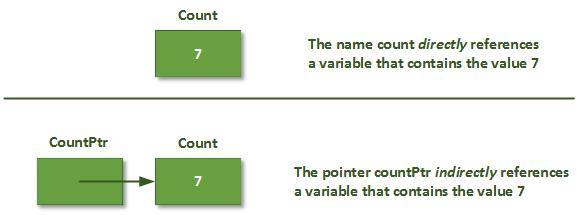Learn C Programming Language
Pointers in C programming
Pointer Variable Definitions and Initialization
Pointers are variables whose values are memory addresses. Normally, a variable directly contains a specific value.
A pointer, on the other hand, contains an address of a variable that contains a specific value. In this sense, a variable name directly references a value, and a pointer indirectly references a value. Referencing a value through a pointer is called indirection.
Declaring Pointers, like all variables, must be defined before they can be used.

int *countPtr, count;Pointer Operators
The &, or address operator, is a unary operator that returns the address of its operand.
//the definition
int y = 5;
int *yPtr;
//the statement assigns the address of
the variable y to pointer variable yPtr.
yPtr = &y;
Variable yPtr is then said to “point to” y.
The unary * operator, commonly referred to as the indirection operator or dereferencing operator , returns the value of the object to which its operand points.
printf( "%d", *yPtr );
The statement prints the value of variable y, namely 5. Using * in this manner is called dereferencing a pointer.
Demonstrating the & and * Operators
The code below demostrate the operators:
// Using the & and * pointer operators.
#include <stdio.h>
int main( void ) {
int a; // a is an integer
int *aPtr; // aPtr is a pointer to an integer
a = 7;
aPtr = &a; // set aPtr to the address of a
printf( "The address of a is %p"
"\nThe value of aPtr is %p", &a, aPtr );
printf( "\n\nThe value of a is %d"
"\nThe value of *aPtr is %d", a, *aPtr );
printf( "\n\nShowing that * and & are complements of "
"each other\n&*aPtr = %p"
"\n*&aPtr = %p\n", &*aPtr, *&aPtr );
} // end main
Output:
The address of a is 0029FF0C
The value of aPtr is 0029FF0C
The value of a is 7
The value of *aPtr is 7
Showing that * and & are complements of each other
&*aPtr = 0029FF0C
*&aPtr = 0029FF0C
Ads Right

